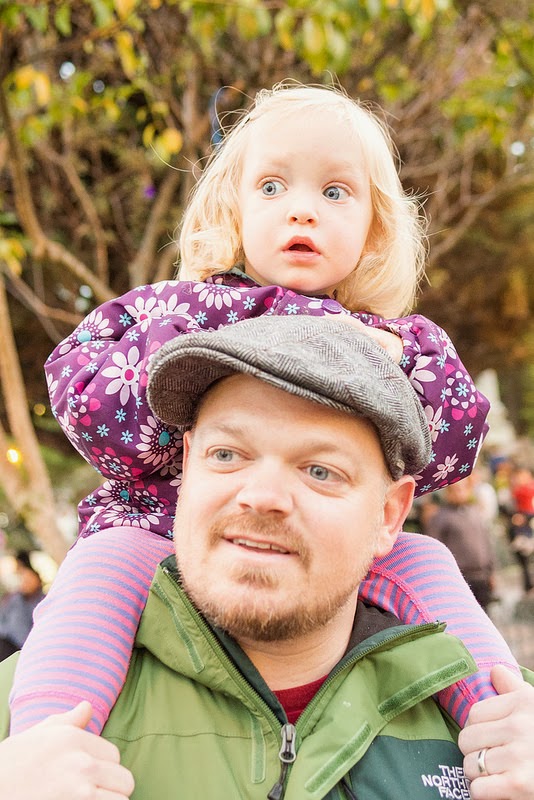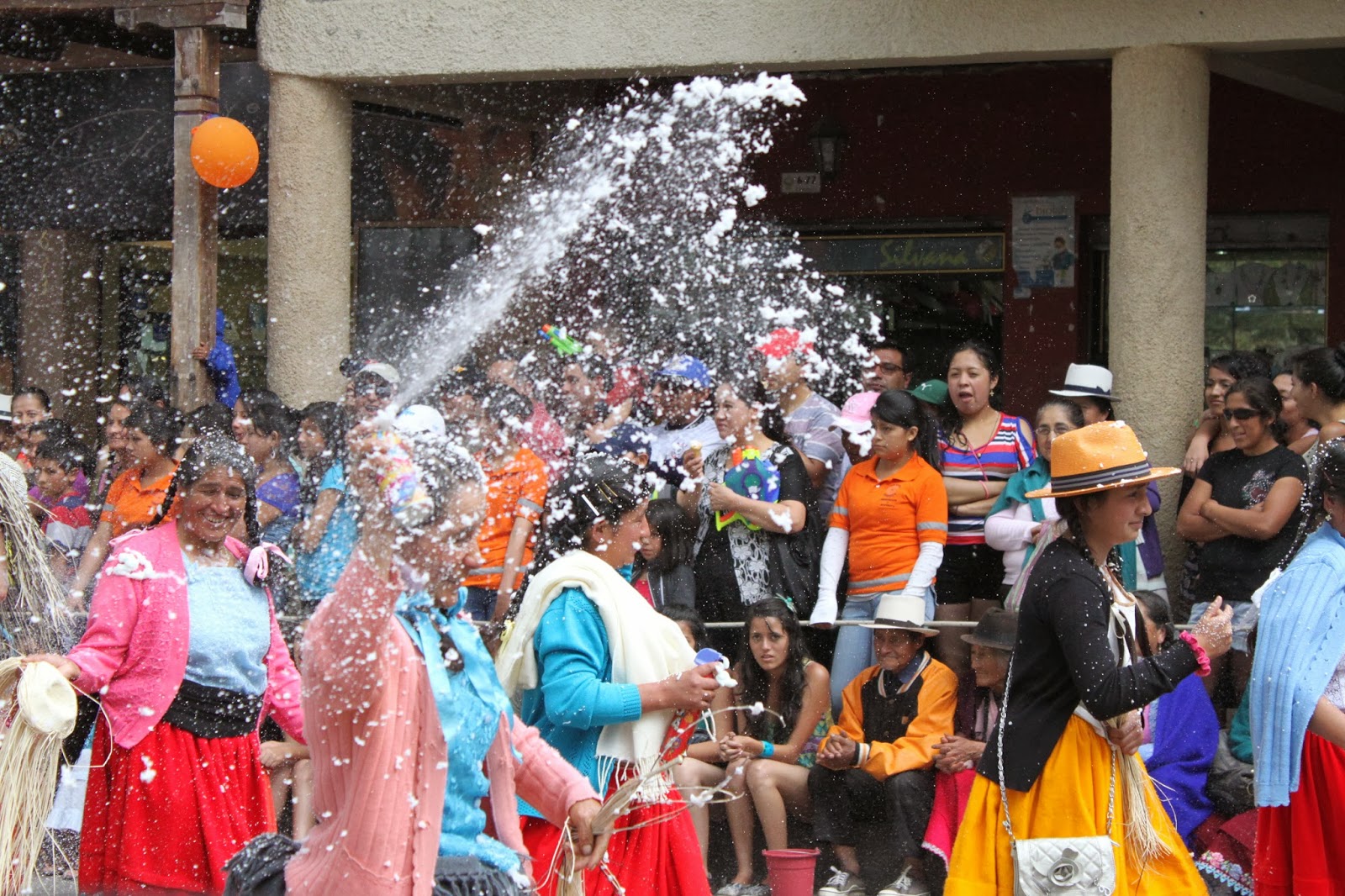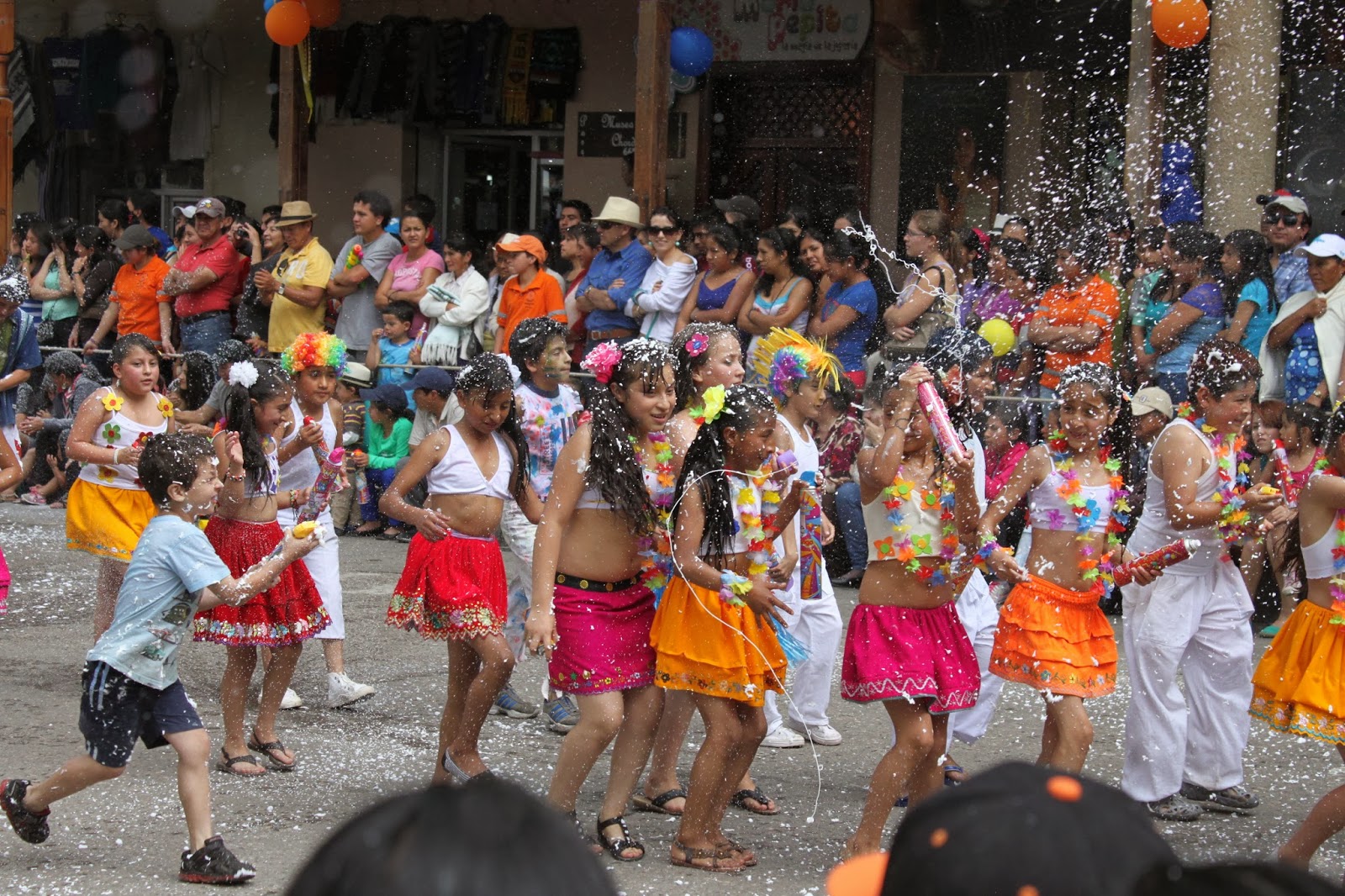 |
| The "opening ceremonies' of Carnaval in Parque Calderon |
In Ecuador, the key ingredients for a successful, unrestrained Carnaval celebration are corn starch, carioca (shaving cream-foam delivered by canisters with impossibly long streams), and water. . . LOTS of water. For 5 days, everyone throws water on everyone else, all day long. Weapons of choice are balloons and water guns, but hoses, buckets, and large city fountains are also popular. The government officially frowns upon this behavior and issues warnings to the "diablitos" ("little devils", the term for kids who are especially fond of carnaval mayhem), but we witnessed first-hand a band of police officers with good-natured smiles get drenched in water and shaving cream. Friday through Tuesday are official government holidays (no school, many businesses closed) so many locals leave town to avoid the water-warfare. The city was a ghost-town! We braved it and even went out for walks, which is risky. Cuenca is a beautiful, colonial city, which means it has many narrow streets and sidewalks and buildings with beautiful balconies, perfect launching pads for water balloon drops and bucket dumps. We mostly escaped unscathed but got a few drops here and there (see photos below!)
 |
| mesmerized by the spectacle |
 |
| watching the festivities with Jared, Annie, and Coco |
 |
| Fireworks are an almost-daily occurrence in Cuenca, but for Carnaval, they bring out the big guns! |
 |
| our intrepid friend and photographer, Rich, was a favorite target of the diablitos |
Our big excursion for the long weekend was a day trip to the towns of San Bartolomé and Chordeleg with our friends Jared, Annie, and their daughter, Coco. This was a spontaneous, unresearched (on my part) trip, like Craig and I used to do before we had children. I didn't even know where these towns were on the map until we got home. We jumped on a bus from the main terminal in Cuenca to a city we believed to be near our desired destination, only to discover once we were on the bus that it was several hours away! However, after about 45 minutes we realized that we would be going through San Bartolomé, a quaint little town about 20 miles east of Cuenca known for guitar-making. On these long bus rides between cities, there is a person who walks up and down the aisle of the bus to collect fares periodically. We asked him if we would be able to get off in the town and he emphatically denied us, despite admitting that they would probably be picking up people in the town. We decided to force the issue when the bus stopped and just bull-dozed our way to the front, ready to use the ol', "my kid's gotta go to the bathroom. . . NOW!" No big deal, lots of other people were also getting off the bus. It was a quaint little town with a beautiful church, but the guitar shops were closed for Carnaval and we had missed the local crafts fair. We decided to try to find a way to the next town, Chordeleg, which is known for silver jewelry and was set to have a big Carnaval parade. When I went into a local business to ask about taxi availability, he directed me to a "guy down the street with a truck." Sure enough, the guy down the street agreed to take all 7 of us in his pick-up truck for $10. (Right now, my father is taking a deep breath and saying a little prayer for his daughter and her questionable decision-making and wishing he could have prohibited me from moving to South America!)
 |
| The 2 clocks do not agree, and neither of them was correct! |

 |
| diablitos! |
 |
| these little guys had some serious firepower! |
 |
| the local women couldn't get enough of our blondies and draped them with "serpentinas" (streamers) |
 |
| our "taxi" |
 |
| why, Jared, what a lovely blue sky behind you! No chance of any rain today, right??? (wink,wink) |
 |
| the road to Chordeleg |
 |
| This mercado is much fancier than the ones in Cuenca |
 |
| Proof that they really will dump buckets of water on you! |
 |
| That's right… she's got a hose |
 |
| Town square of Chordeleg |
 |
| Cuy (guinea pig!) An Ecuadorian delicacy and more expensive than chicken or beef. Craig is dying to try it but is battling with the cheapskate within him. |
Then the real fun started. I am not usually that interested in parades, but a Carnaval parade is a spectacle of color, music, foam, and even more water! In a normal parade, you could say the participants (marching bands, dignitaries riding in old school convertibles, local high school dance squad) are in the enviable position of performing, receiving cheers and applause. During Carnaval, it's like being forced to march, slowly, past an unending firing squad, whose ammunition is shaving cream and water. Some participants, however, were ready to fight back. A group of older, indigenous women marched down the street, covered in foam. My first reaction was, "this has gone too far, show some respect!" Then I realized that they were packing their own cans of foam within the folds of their brightly-colored, velvet skirts and having a great time.
 |
| Sofia was not a fan of the foam |


We were so distracted by the street party, that we initially failed to notice the darkening skies overhead. The rain held off for the majority of the parade, but finally, the clouds opened up and dumped a tremendous amount of rain on everyone. (It's ironic that people still run for cover from the rain, despite the fact that most of them were drenched from the Carnaval festivities!) Party's over. Now it's time to figure out how to get home. We were directed to a bus "terminal" just a few blocks from the town square, where buses to Cuenca run every 30 minutes. When we arrived, we discovered that "terminal" was an overstatement. It was a bus stop with a small shelter overhead that was already overflowing with people. We found a small sliver of dry land under the eave of a nearby building and began our wait. Now. . . some of you may be wondering why I'm making such a big deal about the rain since we are from Portland, OR, and stereotypically live with rain every day. Portland gets a lot of gray skies and misty sprinkles. It rarely RAINS. That day in Chordeleg, it RAINED. Rain like you get in Texas or Florida: buckets of big drops.
 |
| waiting for the bus |
When the bus pulled up to the stop, we made a mad dash, along with dozens of other people, but the bus filled up just as we got to the door and they turned us away. Unfortunate, but at least now we were under the shelter of the bus stop and "first in line" for the next bus. While we waited, we contemplated taking a taxi all the way back to Cuenca. A very nice lady sitting next to us informed us that a taxi would cost $15-20 (compared to $1.50 per adult for the bus) and she would call one for us. Our friends were ready to spring for the taxi. . . Craig was having another debate with himself regarding the cost. It was a moot point, as the woman informed us that no taxis were willing to drive to Cuenca because of a rumored police checkpoint that had been placed along the way. It was unclear to us as to what all of the taxi drivers were trying to hide. Anyway, while we waited, a larger crowd of people gathered under and around the shelter. By the time the next bus arrived, we started throwing elbows to ensure our rightful place at the front of the line. We made it on board to discover that all of the seats were full and we would all be standing for the 1+ hour ride home through the curvy mountains. This is the first time that no one offered me their seat on a bus, despite holding a small child. We also ended up in the aisle next to a group of seated, 20-something year-old men, armed with cans of foam, the evidence of their antics still clinging to the ceiling above us. Every time the bus stopped or slowed down, the most obnoxious of the men would lean out the windows, shout at people and spray them or one of his buddies on the bus. We drove like this, Gracie asleep in my arms, Sofie standing in the aisle wedged between me and a seat back for about 15 minutes before one of the young men finally offered us his seat. The 3 of us settled into the seat and both kids slept on my lap almost the entire ride home, with Craig standing in the aisle. All in all, it was a great day.
-- Ileana









What an adventure ! My favorite part was the comment about your father, although I am a little concerned about my "yerno's" dilema with "el dinero". Mamá
ReplyDelete